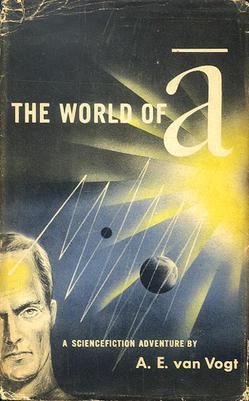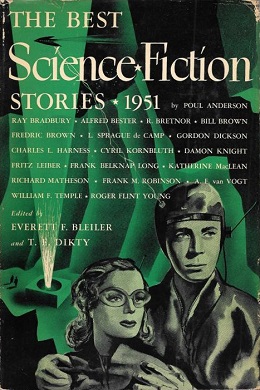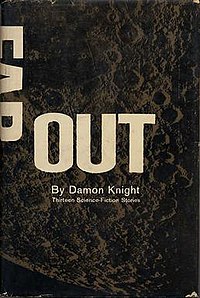
Alfred Elton van Vogt was a Canadian-born American science fiction writer. His fragmented, bizarre narrative style influenced later science fiction writers, notably Philip K. Dick. He was one of the most popular and influential practitioners of science fiction in the mid-twentieth century, the genre's so-called Golden Age, and one of the most complex. The Science Fiction Writers of America named him their 14th Grand Master in 1995.

Cyril M. Kornbluth was an American science fiction author and a member of the Futurians. He used a variety of pen-names, including Cecil Corwin, S. D. Gottesman, Edward J. Bellin, Kenneth Falconer, Walter C. Davies, Simon Eisner, Jordan Park, Arthur Cooke, Paul Dennis Lavond, and Scott Mariner.

James Benjamin Blish was an American science fiction and fantasy writer. He is best known for his Cities in Flight novels and his series of Star Trek novelizations written with his wife, J. A. Lawrence. His novel A Case of Conscience won the Hugo Award. He is credited with creating the term "gas giant" to refer to large planetary bodies.

Laurence van Cott Niven is an American science fiction writer. His 1970 novel Ringworld won the Hugo, Locus, Ditmar, and Nebula awards. With Jerry Pournelle he wrote The Mote in God's Eye (1974) and Lucifer's Hammer (1977). The Science Fiction and Fantasy Writers of America gave him the 2015 Damon Knight Memorial Grand Master Award.

Damon Francis Knight was an American science fiction author, editor, and critic. He is the author of "To Serve Man", a 1950 short story adapted for The Twilight Zone. He was married to fellow writer Kate Wilhelm.

The Man Who Sold the Moon is the title of a 1950 collection of science fiction short stories by American writer Robert A. Heinlein.

The World of Null-A, sometimes written The World of Ā, is a 1948 science fiction novel by Canadian-American writer A. E. van Vogt. It was originally published as a three-part serial in 1945 in Astounding Stories. It incorporates concepts from the General Semantics of Alfred Korzybski. The name Ā refers to non-Aristotelian logic.
Orbit was a series of anthologies of new science fiction edited by Damon Knight, often featuring work by such writers as Gene Wolfe, Joanna Russ, R. A. Lafferty, and Kate Wilhelm. The anthologies tended toward the avant-garde edge of science fiction, but by no means exclusively; occasionally the volumes featured nonfiction critical writing or humorous anecdotes by Knight. Inspired by Frederik Pohl's Star Science Fiction series, and in its turn an influence on other original speculative fiction anthologies, it ran for over a decade and twenty-one volumes, not including a 1975 "Best of" collection selected from the first ten volumes.

"To Serve Man" is a science fiction short story by American writer Damon Knight. It first appeared in the November 1950 issue of Galaxy Science Fiction and has been reprinted a number of times, including in Frontiers in Space (1955), Far Out (1961), and The Best of Damon Knight (1976).

The Best Science Fiction Stories: 1951 is a 1951 anthology of science fiction short stories edited by Everett F. Bleiler and T. E. Dikty. An abridged edition was published in the UK by Grayson in 1952 under the title "The Best Science Fiction Stories: Second Series". Most of the stories had originally appeared in 1950 in the magazines Fantasy and Science Fiction, Worlds Beyond, Astounding SF, Other Worlds, Galaxy Science Fiction, Fantastic Story Quarterly, Startling Stories, Collier's Weekly, Thrilling Wonder Stories and Weird Tales.
"Extempore" is a science fiction short story by American writer Damon Knight. It first appeared in the August 1956 issue of Infinity Science Fiction and has been reprinted twice, in Far Out (1961) and The Best of Damon Knight (1976).
"The Last Word" is a science fiction short story by American writer Damon Knight. It first appeared in the February 1957 issue of Satellite Science Fiction and has been reprinted twice, in Far Out (1961) and The Best of Damon Knight (1976).
"Not with a Bang" is a science fiction short story by American writer Damon Knight. It first appeared in the winter 1949 issue of The Magazine of Fantasy and Science Fiction and has been reprinted a number of times, including in Far Out (1961), The Best of Damon Knight (1976), 50 Short Science Fiction Tales, and The Eureka Years (1982).

"Time Enough" is a science fiction short story by American writer Damon Knight. It first appeared in the July 1960 issue of Amazing magazine and has since been reprinted twice, in Far Out (1961) and The Best of Damon Knight (1976).

In Search of Wonder: Essays on Modern Science Fiction is a collection of critical essays by American writer Damon Knight. Most of the material in the original version of the book was originally published between 1952 and 1955 in various science fiction magazines including Infinity Science Fiction, Original SF Stories, and Future SF. The essays were highly influential, and contributed to Knight's stature as the foremost critic of science fiction of his generation. The book also constitutes an informal record of the "Boom Years" of science fiction from 1950 to 1955.

Witches Three is an anthology of three original fantasy stories, edited by the uncredited Fletcher Pratt and published in hardcover by Twayne in 1952. No further editions of the anthology were issued, but each of the stories was later republished.

The SFWA Grand Masters, Volume 3 is an anthology of science fiction short works edited by Frederik Pohl. It was first published in hardcover by Tor Books in June 2001, and in trade paperback by the same publisher in April 2002. It has been translated into Italian.

Nebula Award Stories 7 is an anthology of award-winning science fiction short works edited by Lloyd Biggle, Jr. It was first published in the United Kingdom in hardcover by Gollancz in November 1972. The first American edition was published by Harper & Row in January 1973; a Science Fiction Book Club edition, also in hardcover, followed in March of the same year. Paperback editions followed from Harrow Books in the U.S. in 1973, and Panther in the U.K. in December 1974. The American editions bore the variant title Nebula Award Stories Seven. The book has also been published in German.

Nebula Awards Showcase 2004 is an anthology of award-winning science fiction short works edited by Vonda N. McIntyre. It was first published in trade paperback by Roc/New American Library in March 2004.

"Babel II" is a comedic science fiction short story by Damon Knight. The protagonist accidentally causes a second Tower of Babel through his interactions with a trans-dimensional traveller. First published in Beyond Fantasy Fiction in 1953, the story has been a topic of commentary ever since.
















